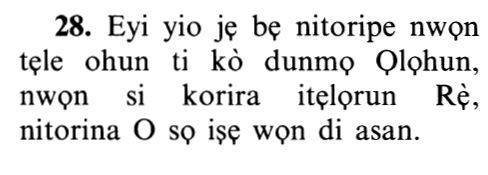47vs28
Select any filter and click on Go! to see results
ذَلِكَ بِأَنَّهُمُ اتَّبَعُوا مَا أَسْخَطَ اللَّهَ وَكَرِهُوا رِضْوَانَهُ فَأَحْبَطَ أَعْمَالَهُمْ
Thalika biannahumu ittabaAAoo ma askhata Allaha wakarihoo ridwanahu faahbata aAAmalahum
Index Terms
Click to play
Yoruba Translation

Hausa Translation
Wannan, dõmin lalle sũ sun bi abin da ya, fusãtar da Allah kuma sun ƙi yardarSa, sabõda haka Ya ɓãta ayyukansu.
Asbabu n-Nuzuul (Occasions of Revelation)
Because of the above, Allah says,
ذَلِكَ بِأَنَّهُمُ اتَّبَعُوا مَا أَسْخَطَ اللَّهَ وَكَرِهُوا رِضْوَانَهُ فَأَحْبَطَ أَعْمَالَهُمْ ﴿٢٨﴾
That is because they pursued what angered Allah and disliked what earns His pleasure, so He rendered their deeds worthless.
I'raab - grammatical analysis of the Qur'an
«أَمْ» حرف إضراب وعطف.
«حَسِبَ الَّذِينَ» ماض وفاعله والجملة مستأنفة.
«فِي قُلُوبِهِمْ» جار ومجرور خبر مقدم.
«مَرَضٌ» مبتدأ مؤخر والجملة الاسمية صلة الموصول.
«أَنْ» حرف مشبه بالفعل مخففة من الثقيلة واسمها ضمير الشأن محذوف.
«لَنْ يُخْرِجَ» مضارع منصوب بلن.
«اللَّهُ» لفظ الجلالة فاعل.
«أَضْغانَهُمْ» مفعول به والجملة الفعلية خبر أن وأن وما بعدها في تأويل مصدر سد مسد مفعولي حسب.
